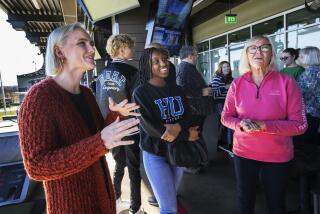America’s OSS Agents, Thai ‘Students’ Remember Daring World War II Exploits
BANGKOK, Thailand — On a stormy night more than 42 years ago, Francis Loetterle parachuted into Thailand on a mission to train 300 “Free Thai” in sabotage, street fighting and jungle warfare against the Japanese army.
His more recent arrival was far less risky and adventurous, but he said it was just as important to him.
The 69-year-old retired business executive from Scottsdale, Ariz., came this time for a reunion with a number of his surviving Thai “students” as well as other American secret agents who worked for the U.S. Office of Strategic Services (OSS), forerunner to today’s Central Intelligence Agency.
The one-time operatives, some slow of step or walking with canes, called each other by their agent code names, carried tags of long disbanded units and reminisced about their intelligence gambits, costly blunders and operating behind Japanese lines.
Alexander MacDonald, who was the commander of an OSS unit in Thailand in those final months of World War II in the Pacific and still lives here, met his old communications man, Dilworth Brinton of Mesa, Ariz., for the first time since the war. He also went shopping with his former wife, Betty McIntosh of Leesburg, Va., who served with OSS in China and wrote a book titled “Undercover Girl.”
Her specialty, she said, was concocting rumors, lies and fake orders to demoralize Japanese forces.
Loetterle said, “Frankly, I’m not big on dirty tricks, the CIA. But ours was a wonderful mission and without question one of the finest experiences of my life. I was appreciated--and am to this day. The Thais never forgot.”
The 70 OSS veterans, wives and widows were welcomed back in Bangkok with high honors, including an audience with King Bhumibol Adulyadej.
The OSS agents are widely credited here with helping check postwar demands by the British and other Allies that Thailand be treated as an enemy nation since it had formally sided with the Japanese.
MacDonald and some of the other OSS agents stayed in Thailand after the war.
MacDonald started the English-language newspaper Bangkok Post. Willis Bird pioneered Thailand’s stock market. Jim Thompson revived the country’s silk industry and disappeared in the Malaysian jungles under mysterious circumstances in 1967.
“We worked with anybody who would help us win the war, and they weren’t all Sunday-school types,” recalled Geoffrey Jones, a New York City resident who is president of The Veterans of the OSS. “We tried crazy things--but some of them were successful.”
Jones said one flawed project was to attach firebombs to bats that were to land beneath Japanese houses. It turned out the bats were a homing species, however, and they returned upon release to set fire to the experimental site headquarters.
But the OSS also notched major triumphs. Detachment 101, for example, operated with great success behind Japanese lines in Burma. It is regarded as the first U.S. unit to organize local guerrillas for intelligence and combat--a forerunner of the U.S. Army Green Berets in Vietnam.
In Vietnam during World War II, the OSS worked with Ho Chi Minh’s guerrillas, and after Japan’s surrender in 1945 argued with Washington that the United States should maintain ties with the Communist revolutionary leader rather than side with the French in Indochina. Ho’s forces defeated the French in 1954 and the South Vietnamese and the Americans in 1975.
The OSS was disbanded Sept. 20, 1945, four years after it was formed, and while some of its members, like Betty McIntosh, joined its successor, the CIA, many returned to civilian life.
More to Read
Sign up for Essential California
The most important California stories and recommendations in your inbox every morning.
You may occasionally receive promotional content from the Los Angeles Times.









